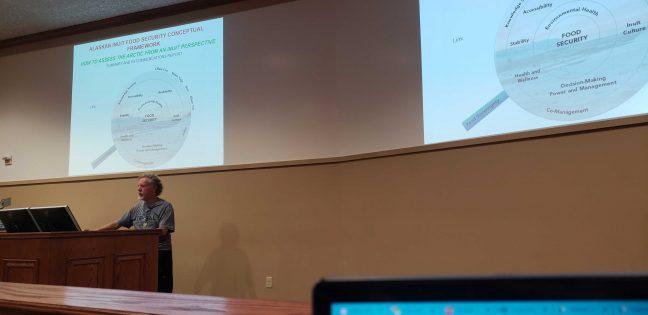Thursday, meteorologist Bob Rabin delivered a talk about the traditional scientific efforts taken for sustainability of the Iñupiat people of Alaska as part of the Nelson Insitiute for Environmental Sciences’ Weston Roundtable series.
Rabin helps teach science and study language at Ilisaġvik College in Utqiaġvik (Barrow), Alaska — a college serving the needs of many members of the indigenous Iñupiat people.
Rabin said that to the community of Barrow, food and the environment serve a purpose both culturally and practically. The Iñupiat hunt elk, foxes, seals and whales. He read from an Iñupiat text about the importance of this environmental relationship to the people.
Leaders in campus sustainability weigh in on University efforts to combat climate change
“Food is a lifeline to the community,” Rabin said. “All of the animals, all of the plants, all of the water, the air, the land, is all of what we are … It is who we are.”
Rabin said the Iñupiat vernacular reveals a heavy cultural emphasis on the environment. When it comes to telling directions alone, their language has nine adverbs to describe position, and when it comes to weather, the language has 76 words describing snow and 200 words describing ice.
Rabin said weather, currents and wind all become paramount to sustaining the Iñupiat society, and as a result, they have words like “mumiqqaq,” which describes the process of winds changing direction, and “qisu,” which describes the color of water reflected in the sky. English doesn’t have the same kind of terms, Rabin said.
Rabin said the importance of climate is so ingrained in Iñupiat society that children are taught early to watch and follow the weather, as it’s a useful skill for hunting.
Global Health Institute director discusses effect of climate change on health, social justice
“If you’re a young boy, the first thing you’re taught is to go out and observe the weather,” Rabin said.
The Iñupiat language contains words for climatic changes like “okuilluk,” and they tell stories about learning to adapt to new climates. In the past few years, they’ve begun to experience ice melting as atmospheric temperatures increase.
Rabin said the Iñupiat community has noticed shortened periods of ice coverage, and instances of rapid ice melting. These threaten their hunting and food storage methods, so the people must adapt to these severe climate changes. Many of their current technologies, like ice cellars for freezing meat, depend on cold temperatures, so they’ve had to draft ideas for refrigerator-like storage houses, and brainstorm other solutions.
“The ice, it changes by the hour,” Rabin said.
Rabin relayed several accounts of climate change by the Iñupiat people, including air pollution from the south, warm water currents lurking below the surface, increasing solar radiation and even shifts in the direction of the sunset.
Panel of diverse political perspectives discuss Green New Deal, issue of climate change
Rabin said the Iñupiat’s experiential methods of science may change with new technologies and reiterated the cultural importance of sustainability to their community.
“There’s a deep connection with the food, and the interconnectedness of things … but their survival is dependent upon [hunting] as well,” Rabin said.



















